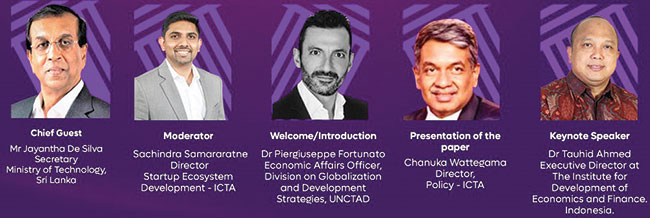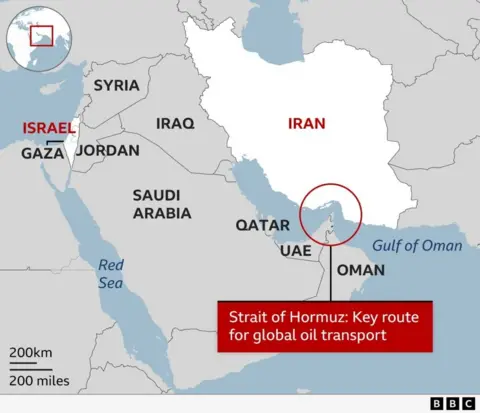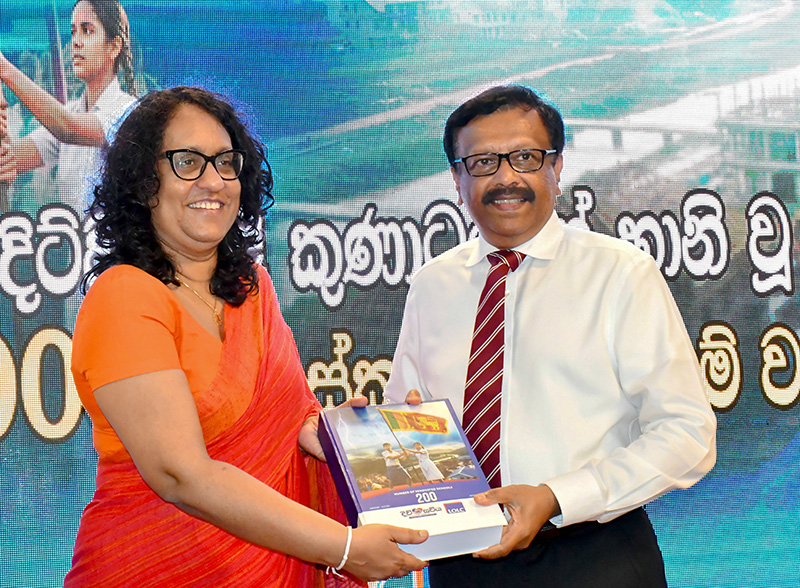Business
Sri Lanka’s Digital Economy has reached 4.37% of GDP says ICTA and UNCTAD Digital Policy Paper

The Information and Communication Technology Agency (ICTA) of Sri Lanka in collaboration with UNCTAD (United Nations Conference on Trade and Development) launched a Policy Paper on the Digital Economy of Sri Lanka at a virtual event held recently. The paper, titled ‘Digital Economy of Sri Lanka: National Goals and Lessons from the South’ will facilitate benchmarking Sri Lanka against the Digital Economy of the People’s Republic of China.
The Chief Guest at the event was Jayantha De Silva – Secretary of the Ministry of Technology while the Keynote Speaker was Dr. Tauhid Ahmed – Executive Director at the Institute for Development of Economics and Finance, Indonesia. Dr. Piergiuseppe Fortunato – Economic Affairs Officer of the UNCTAD delivered the Welcome Address and introduced the paper after which Chanuka Wattegama – Director Policy of the ICTA presented the details of the paper to the online audience. The event was moderated by Sachindra Samararatne – Director of Startup Ecosystem Development of the ICTA.
Sri Lanka remains optimistic in the middle of its post-COVID-19 economic recovery, given its relatively developed digital landscape with more than 60% of the population owning mobile phones and a significant number accessing the Internet on a regular basis, said the paper. The Digital Economy in Sri Lanka, estimated to be USD 3.47 billion or 4.37% of GDP, is gradually emerging. Sri Lanka’s ICT/BPM workforce is supposed to reach 300,000 from 125,000 in 2018, which would then be supporting a USD 3 billion industry in 2024, from the current USD 1 billion.
Sri Lanka has identified ‘Building a Technology-based society’ a key national initiative in its National Policy Framework (NPF) “Vistas of Prosperity and Splendour” adopted in December 2019, which constitutes of 10 key policies aimed at achieving the fourfold outcome of a productive citizenry, a contented family, a disciplined and just society and a prosperous nation, the paper further said. Information and Communication Technology Agency (ICTA) of Sri Lanka, the apex ICT institution of the Government, was assigned the task of implementing the policy guidelines. ICTA’s scope relies on three pillars: Digital Government, Digital Economy, and Digital Society. The Digital Economy strategy is further subdivided into five key themes: Technology Industry Development; Startup Ecosystem Development; Technology Diffusion; Capacity Building; and, Regional Cluster Development. Digital Laws and Policies have been identified as enablers.
During his welcome address, Dr. Piergiuseppe Fortunato pointed out, “Sri Lanka has to take advantage of changes in the global economy. It is evident that the supply side and balance of power are changing, along with the demand side and it changes the ways of production and how they are being delivered. The global value chain is now more platform-oriented while big data is prominent and useful for value-added use. This policy framework can provide opportunities for Sri Lanka to facilitate access to big data and build capacity for big data. In order to make companies to use big data, different tools need to be enabled which are addressed in the paper. All of this is evident by what China has done until now.”
Presenting the paper, Mr. Chanuka Wattegama highlighted what lessons Sri Lanka could learn from the most advanced Digital Economy in the South – that of the People’s Republic of China. China’s Digital Economy is the direct result of the recent favourable policies followed by the Chinese government. They include policies in building network infrastructure, acceleration and deep integration of the Internet with the real economy, and enhancing information technology capabilities in all aspects. Digital transformation in China was also possible because of a comprehensive strategy that focused not only on the supply side but created the environment to expand digital infrastructure. Data was also recognized as a key resource for the development of the Digital Economy which was followed by the implementation of data governance policies.
Addressing the audience, Mr. Jayantha De Silva commented, “Successive governments in Sri Lanka have done a lot of work and had numerous plans to bring this country in line with the digital transformation. A key aim is to encourage more Foreign Direct Investment to Sri Lanka from Multi-National Companies, through the construction of “Techno Parks” with state of the art facilities, two of which are already under construction. Consequently, creating more job opportunities to incentivize the retention of trained youth as well.
The policy paper can now be viewed on the websites of UNCTAD (https://unctad.org/system/files/official-document/BRI-Project_RP15_en.pdf) and ICTA (https://www.icta.lk/summary-digital-economy-of-sri-lanka-national-goals-and-lessons-from-the-south/)
The Information and Communication Technology Agency (ICTA) of Sri Lanka are at the forefront of driving digital transformation in the Nation with a vision to make Sri Lanka a digitally inclusive country. ICTA strives to serve the Nation with effective Digital Solutions to transform the lives of Sri Lankan citizens. For more Information about ICTA, visit www.icta.lk.
Business
Oil prices rise after ships attacked near Strait of Hormuz

Global oil prices have risen after at least three ships were attacked near the Strait of Hormuz, as Iran continues to launch strikes across the Middle East in response to ongoing attacks by the US and Israel.
Two vessels have been struck, and an “unknown projectile” was reported to have “exploded in very close proximity” to a third, the UK Maritime Trade Operations Centre (UKMTO) said.
Iran has warned ships not to pass through the strait, which carries about 20% of the world’s oil and gas.
International shipping has almost come to a standstill at the strait’s entrance, with analysts warning that a prolonged conflict could push energy prices even higher.
In early trade in Asia on Monday, global oil prices jumped by more than 10% before those gains eased during the morning.
At 02:00 GMT, Brent crude was more than 4% higher at $76.16 (£56.53) a barrel, while US-traded oil was also up by around 4% at $69.67.
“The market isn’t panicking”, Saul Kavonic, head of energy research at MST Research told the BBC.
“There is more clarity that so far, oil transport and production infrastructure hasn’t been a primary target by any side,” he added.
“The market will be watching for signs that traffic through the Strait of Hormuz returns, which would see oil prices subside again.”
But some analysts have warned it could go over $100 in the event of a prolonged conflict.
On Sunday, the Opec+ group of oil producing nations – which includes Saudi Arabia and Russia – agreed to increase their output by 206,000 barrels a day to help cushion any price rises, but some experts doubt this would help much.
Edmund King, president of the AA, warned the disruption could drive up petrol prices around the world.
“The turmoil and bombing across the Middle East will surely be a catalyst to disrupt oil distribution globally, which will inevitably lead to price hikes,” he said.
“The magnitude and duration of pump price increases depends on how long the conflict goes on.”

Business
Iran strikes could add external pressure on Sri Lanka’s fragile recovery: Analyst

The U.S. and Israeli strikes on Iran have reignited geopolitical tensions in the Middle East, stoking fears of a broader conflict that could disrupt critical energy supply routes – particularly the Strait of Hormuz, through which roughly one-fifth of the world’s oil supply flows. Brent crude has already edged higher, and global oil markets warn prices could climb toward, or even exceed, US$80–100 a barrel if hostilities escalate.
Against this backdrop, an independent economic analyst told The Island that for Sri Lanka – a small, fuel-importing economy with limited domestic energy resources – the implications could be significant.
“Sri Lanka imports over 90% of its petroleum requirements, and any sustained rise in global crude prices would expand the annual import bill, placing renewed pressure on already tight foreign exchange reserves,” he said.
Even moderate spikes in oil prices, he noted, tend to filter quickly through the domestic economy. “Higher fuel costs translate into increased transport and production expenses, which feed into inflation and erode household purchasing power. Freight charges for essential goods – from food items to industrial inputs – would also rise.”
“The Middle East remains a key source of remittances and export demand,” the analyst explained. “A large share of Sri Lankan migrant workers are employed in Gulf economies, while regional markets absorb tea and other exports. Heightened instability could weaken remittance inflows and soften demand, further straining the balance of payments.”
When asked whether the Central Bank of Sri Lanka (CBSL) might be compelled to shift policy in response, the analyst said the monetary authority faces a delicate balancing act.
“Rising import inflation stemming from higher global energy prices could push the Central Bank to maintain – or even tighten – its monetary policy stance in order to safeguard price stability and support the rupee. A firmer stance may be deemed necessary to anchor inflation expectations and preserve market confidence. The Central Bank is therefore likely to monitor inflation data closely in the coming weeks to assess whether energy-driven price pressures prove temporary or more entrenched,” he said.
Meanwhile, Ceylon Petroleum Corporation (CPC) Chairman S. Rajakaruna said that Sri Lanka’s fuel imports – sourced primarily from Singapore and India – reduce immediate exposure to supply disruptions directly linked to Middle Eastern routes. He also sought to allay public concerns, noting that the country currently maintains sufficient fuel stocks for approximately one month and that there need not be any queueing up by the public to hoard supplies.
However, the analyst cautioned that while physical supply may remain stable, global price pass-through effects are an unavoidable risk.
Meanwhile, Opposition politician Wimal Weerawansa said that official assurances of “one month’s stock” tend to unsettle the public, arguing that such statements evoke memories of past shortages and public distress.
By Sanath Nanayakkare
Business
Ministry of Education recognises LOLC Divi Saviya for restoring 200 schools

The Ministry of Education officially recognised LOLC Holdings PLC for its flagship humanitarian initiative, Divi Saviya, at a special ceremony held on 27th February 2026 in Battaramulla. The event marked the second time the Ministry has acknowledged the programme’s contribution to the nation’s education sector.
Group Managing Director/CEO Kapila Jayawardena presented a project update to Prime Minister and Education Minister Dr. Harini Amarasuriya, highlighting the rapid restoration of 200 schools under Phase 02 of ‘Obai, Mamai, Ape Ratai’. The schools were repaired and handed over within just 45 days, enabling students displaced by Cyclone Ditwah to safely resume learning.
Phase 02 follows a needs assessment that identified 200 damaged schools and 4,000 displaced families. Implemented with Divisional Secretariats and Disaster Management Centres, the Rs. 500 million programme has delivered Family Super Packs and school renovations across six districts.
Kapila Jayawardena stated, “It was a privilege to share these outcomes with the Prime Minister. This recognition reflects how private sector collaboration can complement government efforts during national challenges.” Plans are underway to fully rebuild select schools destroyed by the cyclone.
-

 Opinion4 days ago
Opinion4 days agoJamming and re-setting the world: What is the role of Donald Trump?
-

 Features4 days ago
Features4 days agoAn innocent bystander or a passive onlooker?
-

 Features6 days ago
Features6 days agoBuilding on Sand: The Indian market trap
-

 Opinion6 days ago
Opinion6 days agoFuture must be won
-

 Features5 days ago
Features5 days agoRatmalana Airport: The Truth, The Whole Truth, And Nothing But The Truth
-

 Business6 days ago
Business6 days agoDialog partners with Xiaomi to introduce Redmi Note 15 5G Series in Sri Lanka
-

 Business5 days ago
Business5 days agoIRCSL transforms Sri Lanka’s insurance industry with first-ever Centralized Insurance Data Repository
-

 Sports7 days ago
Sports7 days agoCEA halts development at Mandativu grounds until EIA completion













